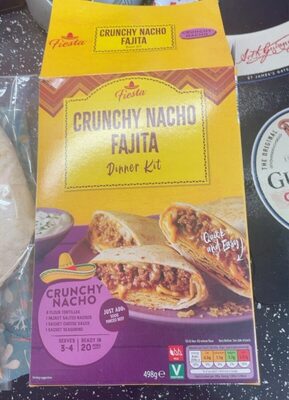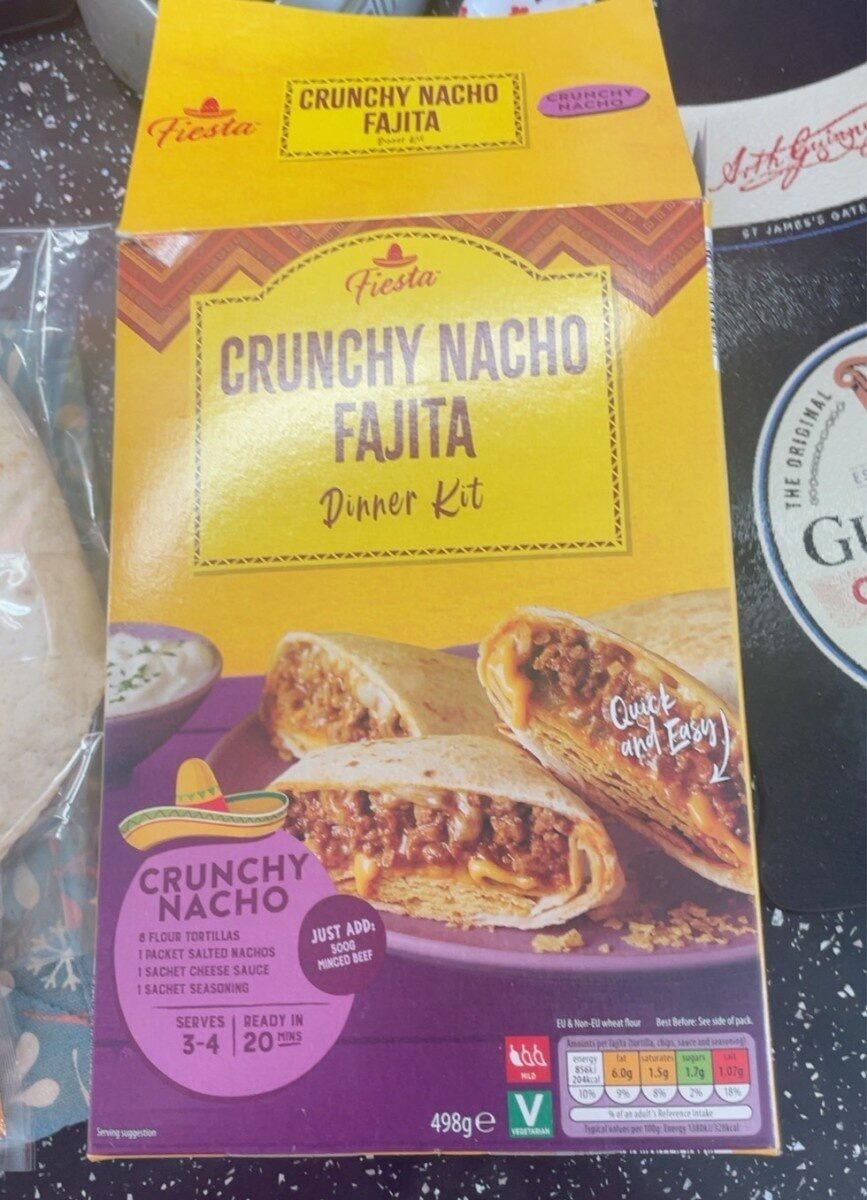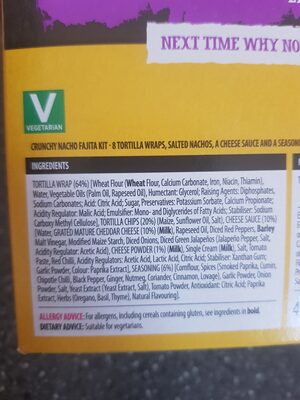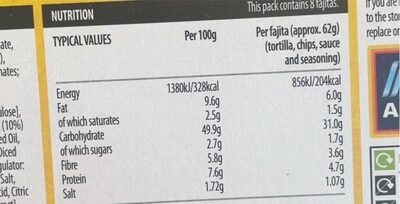Help us make food transparency the norm!
As a non-profit organization, we depend on your donations to continue informing consumers around the world about what they eat.
The food revolution starts with you!
Fajita - Aldi - 498 g
Fajita - Aldi - 498 g
This product page is not complete. You can help to complete it by editing it and adding more data from the photos we have, or by taking more photos using the app for Android or iPhone/iPad. Thank you!
×
Barcode: 4088600183350 (EAN / EAN-13)
Quantity: 498 g
Packaging: Card-box
Brands: Aldi
Labels, certifications, awards: Vegetarian
Countries where sold: United Kingdom
Matching with your preferences
Health
Ingredients
-
86 ingredients
tortilla wrap (64%) [wheat flour (wheat flour, calcium carbonate, iron, niacin, thiamin), water, vegetable oils (palm oil, rapeseed oil), humectant: glycerol, raising agents: diphosphates, sodium carbonates, acid: citric acid, sugar, preservatives: potassium sorbate, calcium propionate, acidity regulator: malic acid, emulsifier: mono - and diglycerides of fatty acids, stabiliser: sodium carboxy methyl cellulose], tortilla chips (20%) (maize, sunflower oil, salt), cheese sauce (10%) [water, grated mature cheddar cheese (10%) (milk), rapeseed oil, diced red peppers, barley malt vinegar, modified maize starch, diced onions, diced green jalapeños (jalapeño pepper, salt, acidity regulator: acetic acid), cheese powder (1%) (milk), single cream (milk), salt, tomato paste, red chilli, acidity regulators: acetic acid, lactic acid, citric acid, stabiliser: xanthan gum, garlic powder, colour: paprika extract), seasoning (6%) [cornflour, spices (smoked paprika, cumin, chipotle chilli, black pepper, ginger, nutmeg, coriander, cinnamon, lovage), garlic powder, onion powder, salt, yeast extract (yeast extract, salt), tomato powder, antioxidant: citric acid, paprika extract, herbs (oregano, basil, thyme), natural flavouring],Allergens: Gluten, Milk
Food processing
-
Ultra processed foods
Elements that indicate the product is in the 4 - Ultra processed food and drink products group:
- Additive: E160c - Paprika extract
- Additive: E415 - Xanthan gum
- Additive: E422 - Glycerol
- Additive: E450 - Diphosphates
- Additive: E466 - Sodium carboxy methyl cellulose
- Additive: E471 - Mono- and diglycerides of fatty acids
- Ingredient: Colour
- Ingredient: Emulsifier
- Ingredient: Flavouring
- Ingredient: Humectant
Food products are classified into 4 groups according to their degree of processing:
- Unprocessed or minimally processed foods
- Processed culinary ingredients
- Processed foods
- Ultra processed foods
The determination of the group is based on the category of the product and on the ingredients it contains.
Additives
-
E202 - Potassium sorbate
Potassium sorbate (E202) is a synthetic food preservative commonly used to extend the shelf life of various food products.
It works by inhibiting the growth of molds, yeast, and some bacteria, preventing spoilage. When added to foods, it helps maintain their freshness and quality.
Some studies have shown that when combined with nitrites, potassium sorbate have genotoxic activity in vitro. However, potassium sorbate is generally recognized as safe (GRAS) by regulatory authorities.
-
E260 - Acetic acid
Acetic acid: Acetic acid , systematically named ethanoic acid , is a colorless liquid organic compound with the chemical formula CH3COOH -also written as CH3CO2H or C2H4O2-. When undiluted, it is sometimes called glacial acetic acid. Vinegar is no less than 4% acetic acid by volume, making acetic acid the main component of vinegar apart from water. Acetic acid has a distinctive sour taste and pungent smell. In addition to household vinegar, it is mainly produced as a precursor to polyvinyl acetate and cellulose acetate. It is classified as a weak acid since it only partially dissociates in solution, but concentrated acetic acid is corrosive and can attack the skin. Acetic acid is the second simplest carboxylic acid -after formic acid-. It consists of a methyl group attached to a carboxyl group. It is an important chemical reagent and industrial chemical, used primarily in the production of cellulose acetate for photographic film, polyvinyl acetate for wood glue, and synthetic fibres and fabrics. In households, diluted acetic acid is often used in descaling agents. In the food industry, acetic acid is controlled by the food additive code E260 as an acidity regulator and as a condiment. In biochemistry, the acetyl group, derived from acetic acid, is fundamental to all forms of life. When bound to coenzyme A, it is central to the metabolism of carbohydrates and fats. The global demand for acetic acid is about 6.5 million metric tons per year -Mt/a-, of which approximately 1.5 Mt/a is met by recycling; the remainder is manufactured from methanol. Vinegar is mostly dilute acetic acid, often produced by fermentation and subsequent oxidation of ethanol.Source: Wikipedia
-
E270 - Lactic acid
Lactic acid: Lactic acid is an organic compound with the formula CH3CH-OH-COOH. In its solid state, it is white and water-soluble. In its liquid state, it is colorless. It is produced both naturally and synthetically. With a hydroxyl group adjacent to the carboxyl group, lactic acid is classified as an alpha-hydroxy acid -AHA-. In the form of its conjugate base called lactate, it plays a role in several biochemical processes. In solution, it can ionize a proton from the carboxyl group, producing the lactate ion CH3CH-OH-CO−2. Compared to acetic acid, its pKa is 1 unit less, meaning lactic acid deprotonates ten times more easily than acetic acid does. This higher acidity is the consequence of the intramolecular hydrogen bonding between the α-hydroxyl and the carboxylate group. Lactic acid is chiral, consisting of two optical isomers. One is known as L--+--lactic acid or -S--lactic acid and the other, its mirror image, is D--−--lactic acid or -R--lactic acid. A mixture of the two in equal amounts is called DL-lactic acid, or racemic lactic acid. Lactic acid is hygroscopic. DL-lactic acid is miscible with water and with ethanol above its melting point which is around 17 or 18 °C. D-lactic acid and L-lactic acid have a higher melting point. In animals, L-lactate is constantly produced from pyruvate via the enzyme lactate dehydrogenase -LDH- in a process of fermentation during normal metabolism and exercise. It does not increase in concentration until the rate of lactate production exceeds the rate of lactate removal, which is governed by a number of factors, including monocarboxylate transporters, concentration and isoform of LDH, and oxidative capacity of tissues. The concentration of blood lactate is usually 1–2 mM at rest, but can rise to over 20 mM during intense exertion and as high as 25 mM afterward. In addition to other biological roles, L-lactic acid is the primary endogenous agonist of hydroxycarboxylic acid receptor 1 -HCA1-, which is a Gi/o-coupled G protein-coupled receptor -GPCR-.In industry, lactic acid fermentation is performed by lactic acid bacteria, which convert simple carbohydrates such as glucose, sucrose, or galactose to lactic acid. These bacteria can also grow in the mouth; the acid they produce is responsible for the tooth decay known as caries. In medicine, lactate is one of the main components of lactated Ringer's solution and Hartmann's solution. These intravenous fluids consist of sodium and potassium cations along with lactate and chloride anions in solution with distilled water, generally in concentrations isotonic with human blood. It is most commonly used for fluid resuscitation after blood loss due to trauma, surgery, or burns.Source: Wikipedia
-
E282 - Calcium propionate
Calcium propanoate: Calcium propanoate or calcium propionate has the formula Ca-C2H5COO-2. It is the calcium salt of propanoic acid.Source: Wikipedia
-
E296 - Malic acid
Malic acid: Malic acid is an organic compound with the molecular formula C4H6O5. It is a dicarboxylic acid that is made by all living organisms, contributes to the pleasantly sour taste of fruits, and is used as a food additive. Malic acid has two stereoisomeric forms -L- and D-enantiomers-, though only the L-isomer exists naturally. The salts and esters of malic acid are known as malates. The malate anion is an intermediate in the citric acid cycle.Source: Wikipedia
-
E330 - Citric acid
Citric acid is a natural organic acid found in citrus fruits such as lemons, oranges, and limes.
It is widely used in the food industry as a flavor enhancer, acidulant, and preservative due to its tart and refreshing taste.
Citric acid is safe for consumption when used in moderation and is considered a generally recognized as safe (GRAS) food additive by regulatory agencies worldwide.
-
E415 - Xanthan gum
Xanthan gum (E415) is a natural polysaccharide derived from fermented sugars, often used in the food industry as a thickening and stabilizing agent.
This versatile food additive enhances texture and prevents ingredient separation in a wide range of products, including salad dressings, sauces, and gluten-free baked goods.
It is considered safe for consumption even at high intake amounts.
-
E422 - Glycerol
Glycerol: Glycerol -; also called glycerine or glycerin; see spelling differences- is a simple polyol compound. It is a colorless, odorless, viscous liquid that is sweet-tasting and non-toxic. The glycerol backbone is found in all lipids known as triglycerides. It is widely used in the food industry as a sweetener and humectant and in pharmaceutical formulations. Glycerol has three hydroxyl groups that are responsible for its solubility in water and its hygroscopic nature.Source: Wikipedia
-
E450 - Diphosphates
Diphosphates (E450) are food additives often utilized to modify the texture of products, acting as leavening agents in baking and preventing the coagulation of canned food.
These salts can stabilize whipped cream and are also found in powdered products to maintain their flow properties. They are commonly present in baked goods, processed meats, and soft drinks.
Derived from phosphoric acid, they're part of our daily phosphate intake, which often surpasses recommended levels due to the prevalence of phosphates in processed foods and drinks.
Excessive phosphate consumption is linked to health issues, such as impaired kidney function and weakened bone health. Though diphosphates are generally regarded as safe when consumed within established acceptable daily intakes, it's imperative to monitor overall phosphate consumption to maintain optimal health.
-
E466 - Sodium carboxy methyl cellulose
Carboxymethyl cellulose: Carboxymethyl cellulose -CMC- or cellulose gum or tylose powder is a cellulose derivative with carboxymethyl groups --CH2-COOH- bound to some of the hydroxyl groups of the glucopyranose monomers that make up the cellulose backbone. It is often used as its sodium salt, sodium carboxymethyl cellulose.Source: Wikipedia
-
E471 - Mono- and diglycerides of fatty acids
Mono- and diglycerides of fatty acids (E471), are food additives commonly used as emulsifiers in various processed foods.
These compounds consist of glycerol molecules linked to one or two fatty acid chains, which help stabilize and blend water and oil-based ingredients. E471 enhances the texture and shelf life of products like margarine, baked goods, and ice cream, ensuring a smooth and consistent texture.
It is generally considered safe for consumption within established regulatory limits.
-
E500 - Sodium carbonates
Sodium carbonates (E500) are compounds commonly used in food preparation as leavening agents, helping baked goods rise by releasing carbon dioxide when they interact with acids.
Often found in baking soda, they regulate the pH of food, preventing it from becoming too acidic or too alkaline. In the culinary world, sodium carbonates can also enhance the texture and structure of foods, such as noodles, by modifying the gluten network.
Generally recognized as safe, sodium carbonates are non-toxic when consumed in typical amounts found in food.
Ingredients analysis
-
Palm oil
Ingredients that contain palm oil: Palm oil
-
Non-vegan
Non-vegan ingredients: Mature cheddar, Cheese, Single cream
-
Vegetarian
No non-vegetarian ingredients detected
Unrecognized ingredients: Tortilla, Iron, Thiamin, Tortilla
-
Details of the analysis of the ingredients
: tortilla wrap 68.0851063829787% (wheat flour (wheat flour, calcium carbonate, iron, niacin, thiamin), water, vegetable oils (palm oil, rapeseed oil), humectant (glycerol), raising agents (diphosphates), sodium carbonates, acid (citric acid), sugar, preservatives (potassium sorbate), calcium propionate, acidity regulator (malic acid), emulsifier (mono- and diglycerides of fatty acids), stabiliser (sodium carboxy methyl cellulose)), tortilla 21.2765957446809% (maize, sunflower oil, salt), cheese sauce 10.6382978723404% (water, mature cheddar cheese 1.06382978723404%, rapeseed oil, red peppers, barley malt vinegar, modified maize starch, onions, green jalapeños (jalapeño pepper, salt, acidity regulator (acetic acid)), cheese 0.106382978723404%, single cream, salt, tomato paste, red chilli, acidity regulators (acetic acid), lactic acid, citric acid, stabiliser (xanthan gum), garlic, colour (paprika extract), seasoning 0.638297872340426%, cornflour, spices (smoked paprika, cumin, chipotle chilli, black pepper, ginger, nutmeg, coriander, cinnamon, lovage), garlic, onion, salt, yeast extract (yeast extract, salt), tomato, antioxidant (citric acid), paprika extract, herbs (oregano, basil, thyme), natural flavouring)- tortilla wrap -> en:tortilla - percent_min: 68.0851063829787 - percent: 68.0851063829787 - percent_max: 68.0851063829787
- wheat flour -> en:wheat-flour - vegan: yes - vegetarian: yes - ciqual_proxy_food_code: 9410 - percent_min: 5.23731587561375 - percent_max: 68.0851063829787
- wheat flour -> en:wheat-flour - vegan: yes - vegetarian: yes - ciqual_proxy_food_code: 9410 - percent_min: 1.04746317512275 - percent_max: 68.0851063829787
- calcium carbonate -> en:e170i - vegan: maybe - vegetarian: maybe - percent_min: 0 - percent_max: 34.0425531914894
- iron -> en:iron - percent_min: 0 - percent_max: 22.6950354609929
- niacin -> en:e375 - vegan: maybe - vegetarian: maybe - percent_min: 0 - percent_max: 17.0212765957447
- thiamin -> en:thiamin - percent_min: 0 - percent_max: 13.6170212765957
- water -> en:water - vegan: yes - vegetarian: yes - ciqual_food_code: 18066 - percent_min: 0 - percent_max: 34.0425531914894
- vegetable oils -> en:vegetable-oil - vegan: yes - vegetarian: yes - from_palm_oil: maybe - percent_min: 0 - percent_max: 22.6950354609929
- palm oil -> en:palm-oil - vegan: yes - vegetarian: yes - from_palm_oil: yes - ciqual_food_code: 16129 - percent_min: 0 - percent_max: 22.6950354609929
- rapeseed oil -> en:rapeseed-oil - vegan: yes - vegetarian: yes - from_palm_oil: no - percent_min: 0 - percent_max: 11.3475177304965
- humectant -> en:humectant - percent_min: 0 - percent_max: 17.0212765957447
- glycerol -> en:e422 - vegan: maybe - vegetarian: maybe - percent_min: 0 - percent_max: 17.0212765957447
- raising agents -> en:raising-agent - percent_min: 0 - percent_max: 13.6170212765957
- diphosphates -> en:e450 - vegan: yes - vegetarian: yes - percent_min: 0 - percent_max: 13.6170212765957
- sodium carbonates -> en:e500 - vegan: yes - vegetarian: yes - percent_min: 0 - percent_max: 11.3475177304965
- acid -> en:acid - percent_min: 0 - percent_max: 9.72644376899696
- citric acid -> en:e330 - vegan: yes - vegetarian: yes - percent_min: 0 - percent_max: 9.72644376899696
- sugar -> en:sugar - vegan: yes - vegetarian: yes - ciqual_proxy_food_code: 31016 - percent_min: 0 - percent_max: 2.7000000476837
- preservatives -> en:preservative - percent_min: 0 - percent_max: 2.7000000476837
- potassium sorbate -> en:e202 - vegan: yes - vegetarian: yes - percent_min: 0 - percent_max: 2.7000000476837
- calcium propionate -> en:e282 - vegan: yes - vegetarian: yes - percent_min: 0 - percent_max: 2.7000000476837
- acidity regulator -> en:acidity-regulator - percent_min: 0 - percent_max: 2.7000000476837
- malic acid -> en:e296 - vegan: yes - vegetarian: yes - percent_min: 0 - percent_max: 2.7000000476837
- emulsifier -> en:emulsifier - percent_min: 0 - percent_max: 2.7000000476837
- mono- and diglycerides of fatty acids -> en:e471 - vegan: maybe - vegetarian: maybe - from_palm_oil: maybe - percent_min: 0 - percent_max: 2.7000000476837
- stabiliser -> en:stabiliser - percent_min: 0 - percent_max: 2.7000000476837
- sodium carboxy methyl cellulose -> en:e466 - vegan: yes - vegetarian: yes - percent_min: 0 - percent_max: 2.7000000476837
- wheat flour -> en:wheat-flour - vegan: yes - vegetarian: yes - ciqual_proxy_food_code: 9410 - percent_min: 5.23731587561375 - percent_max: 68.0851063829787
- tortilla -> en:tortilla - percent_min: 21.2765957446809 - percent: 21.2765957446809 - percent_max: 21.2765957446809
- maize -> en:corn - vegan: yes - vegetarian: yes - ciqual_food_code: 9200 - percent_min: 7.09219858156028 - percent_max: 21.2765957446809
- sunflower oil -> en:sunflower-oil - vegan: yes - vegetarian: yes - from_palm_oil: no - ciqual_food_code: 17440 - percent_min: 0 - percent_max: 10.6382978723404
- salt -> en:salt - vegan: yes - vegetarian: yes - ciqual_food_code: 11058 - percent_min: 0 - percent_max: 7.09219858156028
- cheese sauce -> en:cheese-sauce - vegan: maybe - vegetarian: maybe - percent_min: 10.7580865361774 - percent: 10.6382978723404 - percent_max: 10.6382978723404
- water -> en:water - vegan: yes - vegetarian: yes - ciqual_food_code: 18066 - percent_min: 0.343170899107756 - percent_max: 1.80851063829787
- mature cheddar cheese -> en:mature-cheddar - vegan: no - vegetarian: maybe - ciqual_food_code: 12726 - percent_min: 1.06382978723404 - percent: 1.06382978723404 - percent_max: 1.06382978723404
- rapeseed oil -> en:rapeseed-oil - vegan: yes - vegetarian: yes - from_palm_oil: no - percent_min: 0.267791636096845 - percent_max: 1.06382978723404
- red peppers -> en:red-bell-pepper - vegan: yes - vegetarian: yes - ciqual_food_code: 20087 - percent_min: 0.23936170212766 - percent_max: 1.06382978723404
- barley malt vinegar -> en:barley-malt-vinegar - vegan: yes - vegetarian: yes - ciqual_food_code: 11018 - percent_min: 0.208825847123719 - percent_max: 0.958186400965613
- modified maize starch -> en:modified-corn-starch - vegan: yes - vegetarian: yes - ciqual_food_code: 9510 - percent_min: 0.18000428736057 - percent_max: 0.749360553841893
- onions -> en:onion - vegan: yes - vegetarian: yes - ciqual_food_code: 20034 - percent_min: 0.157230036701317 - percent_max: 0.569356266481324
- green jalapeños -> en:green-jalapeno-peppers - vegan: yes - vegetarian: yes - ciqual_food_code: 20151 - percent_min: 0.638297872340426 - percent_max: 1.05042410212043
- jalapeño pepper -> en:jalapeno-pepper - vegan: yes - vegetarian: yes - ciqual_food_code: 20151
- salt -> en:salt - vegan: yes - vegetarian: yes - ciqual_food_code: 11058 - percent_max: 7.6
- acidity regulator -> en:acidity-regulator
- acetic acid -> en:e260 - vegan: yes - vegetarian: yes
- cheese -> en:cheese - vegan: no - vegetarian: maybe - ciqual_proxy_food_code: 12999 - percent_min: 0.638297872340426 - percent: 0.106382978723404 - percent_max: 0.106382978723404
- single cream -> en:single-cream - vegan: no - vegetarian: yes - ciqual_food_code: 19402 - percent_min: 0.638297872340426 - percent_max: 0.106382978723404
- salt -> en:salt - vegan: yes - vegetarian: yes - ciqual_food_code: 11058 - percent_min: 0.638297872340426 - percent_max: 0.106382978723404
- tomato paste -> en:tomato-concentrate - vegan: yes - vegetarian: yes - ciqual_food_code: 20068 - percent_min: 0.638297872340426 - percent_max: 0.106382978723404
- red chilli -> en:red-chili-pepper - vegan: yes - vegetarian: yes - ciqual_food_code: 20151 - percent_min: 0.638297872340426 - percent_max: 0.106382978723404
- acidity regulators -> en:acidity-regulator - percent_min: 0.638297872340426 - percent_max: 0.106382978723404
- acetic acid -> en:e260 - vegan: yes - vegetarian: yes
- lactic acid -> en:e270 - vegan: yes - vegetarian: yes - percent_min: 0.638297872340426 - percent_max: 0.106382978723404
- citric acid -> en:e330 - vegan: yes - vegetarian: yes - percent_min: 0.638297872340426 - percent_max: 0.106382978723404
- stabiliser -> en:stabiliser - percent_min: 0.638297872340426 - percent_max: 0.106382978723404
- xanthan gum -> en:e415 - vegan: yes - vegetarian: yes
- garlic -> en:garlic - vegan: yes - vegetarian: yes - ciqual_food_code: 11000 - percent_min: 0.638297872340426 - percent_max: 0.106382978723404
- colour -> en:colour - percent_min: 0.638297872340426 - percent_max: 0.106382978723404
- paprika extract -> en:e160c - vegan: yes - vegetarian: yes
- seasoning -> en:coating - vegan: maybe - vegetarian: maybe - percent_min: 0.638297872340426 - percent: 0.638297872340426 - percent_max: 0.106382978723404
- cornflour -> en:corn-flour - vegan: yes - vegetarian: yes - ciqual_food_code: 9545 - percent_min: 0 - percent_max: 0.106382978723404
- spices -> en:spice - vegan: yes - vegetarian: yes - percent_min: 0 - percent_max: 0.106382978723404
- smoked paprika -> en:smoked-paprika - vegan: yes - vegetarian: yes - ciqual_food_code: 11049
- cumin -> en:cumin - vegan: yes - vegetarian: yes
- chipotle chilli -> en:chipotle - vegan: yes - vegetarian: yes - ciqual_food_code: 20151
- black pepper -> en:black-pepper - vegan: yes - vegetarian: yes - ciqual_food_code: 11015
- ginger -> en:ginger - vegan: yes - vegetarian: yes - ciqual_food_code: 11074
- nutmeg -> en:nutmeg - vegan: yes - vegetarian: yes - ciqual_food_code: 11048
- coriander -> en:coriander - vegan: yes - vegetarian: yes
- cinnamon -> en:cinnamon - vegan: yes - vegetarian: yes
- lovage -> en:lovage - vegan: yes - vegetarian: yes
- garlic -> en:garlic - vegan: yes - vegetarian: yes - ciqual_food_code: 11000 - percent_min: 0 - percent_max: 0.106382978723404
- onion -> en:onion - vegan: yes - vegetarian: yes - ciqual_food_code: 20034 - percent_min: 0 - percent_max: 0.106382978723404
- salt -> en:salt - vegan: yes - vegetarian: yes - ciqual_food_code: 11058 - percent_min: 0 - percent_max: 0.106382978723404
- yeast extract -> en:yeast-extract - vegan: yes - vegetarian: yes - percent_min: 0 - percent_max: 0.106382978723404
- yeast extract -> en:yeast-extract - vegan: yes - vegetarian: yes
- salt -> en:salt - vegan: yes - vegetarian: yes - ciqual_food_code: 11058 - percent_max: 7.6
- tomato -> en:tomato - vegan: yes - vegetarian: yes - ciqual_food_code: 20047 - percent_min: 0 - percent_max: 0.106382978723404
- antioxidant -> en:antioxidant - percent_min: 0 - percent_max: 0.106382978723404
- citric acid -> en:e330 - vegan: yes - vegetarian: yes
- paprika extract -> en:e160c - vegan: yes - vegetarian: yes - percent_min: 0 - percent_max: 0.106382978723404
- herbs -> en:herb - vegan: yes - vegetarian: yes - percent_min: 0 - percent_max: 0.106382978723404
- oregano -> en:oregano - vegan: yes - vegetarian: yes - ciqual_proxy_food_code: 11035
- basil -> en:basil - vegan: yes - vegetarian: yes - ciqual_food_code: 11033
- thyme -> en:thyme - vegan: yes - vegetarian: yes - ciqual_food_code: 11070
- natural flavouring -> en:natural-flavouring - vegan: maybe - vegetarian: maybe - percent_min: 0 - percent_max: 0.106382978723404
- tortilla wrap -> en:tortilla - percent_min: 68.0851063829787 - percent: 68.0851063829787 - percent_max: 68.0851063829787
Nutrition
-
Missing data to compute the Nutri-Score
Missing category
⚠ ️The category of the product must be specified in order to compute the Nutri-Score.Could you add the information needed to compute the Nutri-Score? Add a category
-
Nutrition facts
Nutrition facts As sold
for 100 g / 100 mlEnergy 1,372 kj
(328 kcal)Fat 9.6 g Saturated fat 2.5 g Carbohydrates 49.9 g Sugars 2.7 g Fiber ? Proteins 1.72 g Salt 7.6 g Fruits‚ vegetables‚ nuts and rapeseed‚ walnut and olive oils (estimate from ingredients list analysis) 7.204 %
Environment
-
Eco-Score not computed - Unknown environmental impact
We could not compute the Eco-Score of this product as it is missing some data, could you help complete it?Could you add a precise product category so that we can compute the Eco-Score? Add a category
Packaging
-
Packaging with a medium impact
-
Packaging parts
Box
-
Packaging materials
Material % Packaging weight Packaging weight per 100 g of product
-
Transportation
-
Origins of ingredients
Missing origins of ingredients information
⚠ ️ The origins of the ingredients of this product are not indicated.
If they are indicated on the packaging, you can modify the product sheet and add them.
If you are the manufacturer of this product, you can send us the information with our free platform for producers.Add the origins of ingredients for this product Add the origins of ingredients for this product
Threatened species
-
Contains palm oil
Drives deforestation and threatens species such as the orangutan
Tropical forests in Asia, Africa and Latin America are destroyed to create and expand oil palm tree plantations. The deforestation contributes to climate change, and it endangers species such as the orangutan, the pigmy elephant and the Sumatran rhino.
Report a problem
-
Incomplete or incorrect information?
Category, labels, ingredients, allergens, nutritional information, photos etc.
If the information does not match the information on the packaging, please complete or correct it. Open Food Facts is a collaborative database, and every contribution is useful for all.
Data sources
Product added on by openfoodfacts-contributors
Last edit of product page on by naruyoko.
Product page also edited by inf, kiliweb, moon-rabbit, roboto-app, swipe-studio, vaporous, yuka.sY2b0xO6T85zoF3NwEKvllVfd-LTghL2Ewbho0TQn_mTdL_pZe5Lxq_-DKs.








